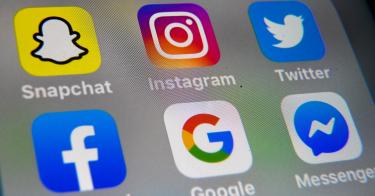People like “Big Tech.” But that doesn’t mean they trust them.
We love their products and services, but we have a deepening distrust of these companies’ motives and practices—and this distrust is degrading our national politics.
It is undeniable that companies like Facebook, Google, and Twitter are a growing part of the public square. About one-in-five adults get their political news primarily through social media, and one-quarter get news from YouTube. These numbers go up significantly as the age of those polled goes down.
Even more, significant majorities have an overall “favorable” opinion of Facebook (71%), Google (90%), and Twitter (61%). And yet, 56% say these companies have too much control over the economy, 72% say Facebook has too much power, and 51% think Google and YouTube should be broken up.
How do we explain these seemingly contradictory results? There is a trust deficit, and much of this deficit is rooted in how these platforms deal with political speech.
According to a Pew Research study, three-quarters of adults believe social media companies “intentionally censor political viewpoints that they find objectionable,” and 72% say social media companies “have too much power and influence in politics today.”
This skepticism is bipartisan. More than 80% of Republicans, but also 52% of Democrats, admit to having little to no confidence “in social media companies to determine which posts on their platforms should be labeled as inaccurate or misleading.”
The recent controversy around the New York Post’s reporting on Hunter Biden and his purported efforts to sell access to his father, former Vice President Joe Biden, illustrate perfectly how these companies are simultaneously powerful and untrusted.
Almost as soon as the New York Post published its story, Twitter blocked users from sharing it. Facebook also limited its spread while kicking it to fact-checkers for review. This immediately provoked charges that the companies were protecting Joe Biden, hurting President Trump, and interfering in the 2020 presidential election.
Neither company helped themselves when they provided evolving justifications for their actions. Twitter CEO Jack Dorsey has issued several apologies for the way the matter was handled and has since changed company policies.
But by then, the damage was done. And the damage is significant.
We are neck-deep into a presidential election, and these companies have, yet again, failed to responsibly wield the influence they have worked so hard to achieve. For years, Big Tech has sought to be essential without being burdened with the winning and keeping of public trust.
They have been secretive, arrogant, dismissive, and political.
Oh, to be sure, they would deny all of these charges. But people, particularly conservatives, have watched while Google defended one of its executives who tweeted, “You are finished, @GOP. You polished the final nail for your own coffins,” then added some gratuitous profanity.
We have seen these companies deliberately assume a “woke” posture and then routinely use moral, ethical, and “right side of history” language to justify actions against those that reject this posture.
>>> Section 230—Mend It, Don’t End It
The problem is not that people don’t understand Big Tech. It's that Big Tech misunderstands the people—and this misunderstanding is now eliciting serious consequences.
Because social media platforms are viewed as biased and untrustworthy, a growing chorus of voices on both sides of the political aisle are calling for the reform, or total removal, of the industry’s legal liability shield found in Section 230 of the Communications Decency Act.
This is no small thing and could decisively shake the entire tech industry. But actions have consequences, and the time for tweeted apologies and posts that promise to do better next time is over.
People don’t want promises—they want results. And if we cannot get results, we will demand accountability.
This piece originally appeared in the Washington Examiner



